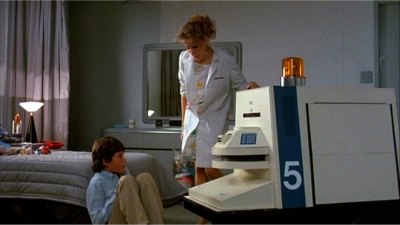This is another one that I saw in the theatre as a child. In fact, I’m pretty sure we saw it in a free sneak preview that we got tickets to when we saw The Great Mouse Detective, and since the chronology on that seems to hold up—they were both 1986 releases—I’m going with those being the movies in question. My whole family enjoyed it at the time, and it’s been a favourite for us ever since. I’m pretty sure that’s not even Nostalgia Goggles.
David Scott Freeman (Joey Cramer) is growing up in Fort Lauderdale, Florida. The year is 1978. On the night of July fourth, he is sent by his parents (Cliff De Young and Veronica Cartwright) through the woods to get his brother Jeff (Albie Whitaker), who is playing at a friend’s house. Jeff jumps out and scares David, who falls back, hits his head, and is knocked out. When he comes to, he returns to the family home—only the family isn’t there. A very nice older couple are, and they call the cops. It turns out that the year is now 1986. David has been missing for eight years, and he has not aged. When tests are done in an attempt to find out what’s happening, his brain waves map images of a craft that has recently been found tangled in power lines.
David is taken to NASA to find out what connection he has to the craft. They find star charts in his head, and his brain talks directly to the computer. He wants to return to his family, even if it isn’t the family he knew, but the people at NASA are more interested in learning what connection he has to the craft, the planet Phaelon, and faster-than-light travel. One morning, David feels a call to the hangar where the craft is held. It turns out David was collected as a specimen for study. Normally, that would mean [explanation] to return him to his own time, but [for reasons], they couldn’t do that for David. Also, the tangle with the power lines wiped the star charts out of the craft’s memory, and it needs to download them. However, when it does, some of David’s personality goes with it.
Okay, I was young and didn’t know the “we only use 90% of our brains” thing was nonsense. I know better now, and I’ll admit it kind of bothers me as a driving aspect of the plot. I was nine, though, and a lot more inclined to just go along with the movie’s explanation. That’s fine. As an adult, it does bother me—though not as much as NASA as a shadowy agency that is willing to hold a child away from his parents for however long without being open about their purposes. I’m much more fond of the NASA that has Carolyn McAdams (Sarah Jessica Parker) wandering around accompanied only by a robot.
While I’m sure Carolyn’s streaked hair and attendance at a Twisted Sister concert are intended to emphasize that David is not in 1978 anymore, the fact remains that she’s still a basically decent person. I did not until this moment realize that Parker was actually twenty-one at the time, and I was mentally hooking her up with the 1986 version of Jeff (Matt Adler), though his aesthetic was a bit more preppy. Heck, even Dr. Louis Farraday (Howard Hesseman), the NASA scientist who’s keeping David, is still a decent person. There is no real villain in this. There is just a desire to gather information that seems to forget that David, too, is a decent person with his own needs.
And then, there is the craft. It is an automated scout ship designated a Trimaxion drone ship. David dubs it “Max.” And while the voice actor may have been credited “Paul Mall,” no child growing up in 1986 could have heard certain lines and not recognized that it was in fact Paul Reubens, even those of us who never were fans of Pee Wee’s Playhouse. He says this is why he then became the voice of RX-24, “Rex,” on the Disney attraction Star Tours. And while the recent changes to the ride are pretty interesting for the most part, I’d rather have Rex back than Artoo and Threepio.
I’m not claiming director Randal Kleiser is some underrated marvel or anything; calling this the best of his movies is frankly damning it with faint praise, unless you’re a fan of Grease. Which I’m not. Still, this movie is underrated, in that hardly anyone considers it at all. Arguably, yes, it’s a gateway drug to science fiction for preadolescents, but since it succeeded at that for me, I wouldn’t say that’s a bad thing. It’s not exactly a conventional science fiction story, and it’s definitely a lot more fiction than science. Still, there is a charm to it that I think most people are missing by never having heard of it.
It gives room for a lot of feelings, too. David really wants to get back to his family, but at the same time, how can piloting a spaceship not be fun? Bill and Helen Freeman are desperately glad to get their son back. Jeff has been carrying a huge burden of guilt for eight years, and it frankly sounds as though his parents let him. More than is healthy. Probably they blame him, too, even though there’s no way what happened was really his fault. After all, the NASA scientists aren’t the only ones taking a child away from his home.

